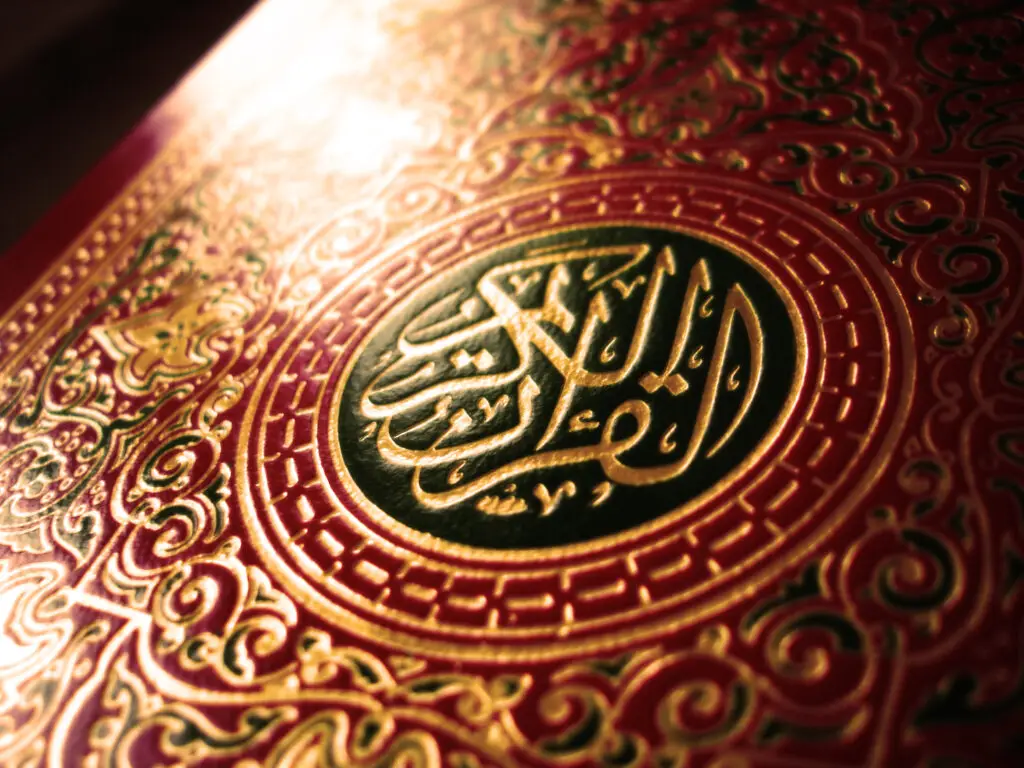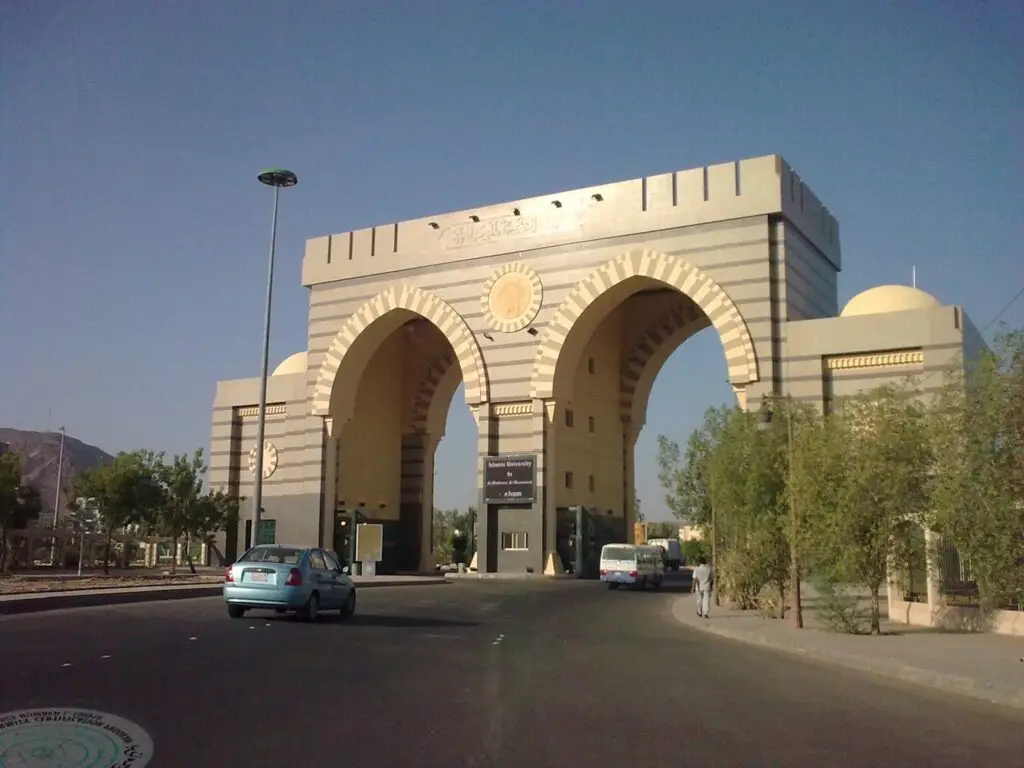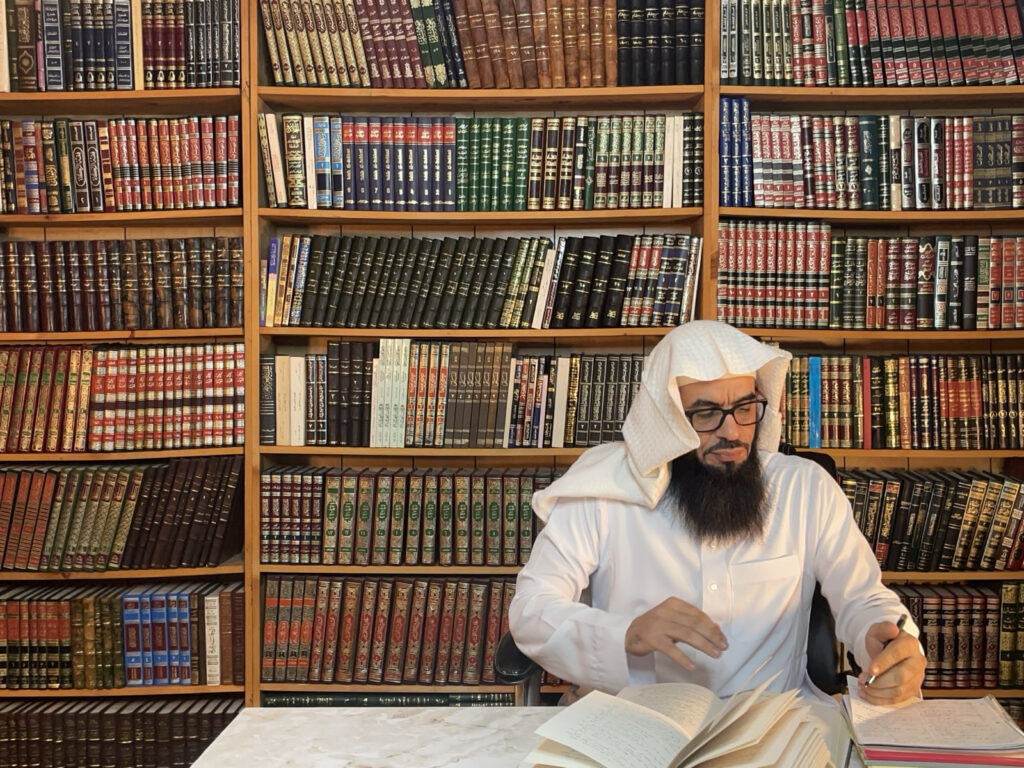Shaykh Ahmad Musā Jibrīl was born in 1971 to a Palestinian family in the United States. While he was still very young, his father (Shaykh Musā Jibrīl) shifted his family to Saudi Arabia to pursue Islamic knowledge at the Islamic University of Madīnah. During the duration of his stay in Madīnah, Shaykh Ahmad completed his memorization of the Qur’an at the young age of 11. Upon the completion of his father’s studies, when Shaykh Ahmad was 12 years old, the family returned to the United States, and Shaykh Ahmad spent his adolescent years studying Islam from his father. He committed the entirety of Sahīh Bukhari and Sahīh Muslim to memory before he graduated from high school in 1989, and subsequently went on to memorize their chains of narration. The Shaykh also studied from others during his younger years, including the martyred Shaykh Ehsān Ilāhi Zaheer (who was a classmate of Shaykh Musā’s), and he memorized many of Shaykh Ehsān’s books. Upon seeing the extent of Shaykh Ahmad’s memorization and understanding of his writing, Shaykh Ehsān remarked, “This boy knows my books more than me.” When Shaykh Musā invited Shaykh Ehsān to the States, he told Shaykh Musā “You raised a Mujaddid Insha’Allah”, referring to Shaykh Ahmad. The Shaykh further went on to memorize all the 9 books of Ahādith (Sahih Bukhari, Sahih Muslim, Sunan Nasā’i, Sunan Abi Dawud, Sunan at-Tirmidhi, Sunan Ibn Majah, Muwatta Imām Malik, Sunan ad-Darimi, and Musnad Ahmad).
Upon completing high school in the States, Shaykh Ahmad Jibrīl followed in his father’s footsteps, returning to Madīnah for a second time to pursue a degree in the faculty of Shari’ah at the Islamic University of Madīnah. Independent from the university curriculum, the Shaykh sought knowledge personally with many world-renowned ‘Ulamā’ in the Kingdom, and had the honor of attending private classes with many of them. He studied several books cover to cover with Ibn ‘Uthaymeen, earning a rare Tazkiyyah from him, and also received Tazkiyyah from Ibn Bāz just 3 months before his passing, in which he encouraged Muslims in the US to take from Shaykh Ahmad and Shaykh Musā, and praised their Da’wah efforts and knowledge. Ibn Bāz said about him, “A Shaykh who has good ‘Aqeedah (Beliefs) and is well known to me.”
Shaykh Ahmad also attended private classes with Shaykh Bakr Abu Zayd, in which he studied some books of Imam Muhammad Ibn ‘Abdul Wahhāb and Shaykh Al-Islam Ibn Taymiyyah. Additionally, he studied under Shaykh Muhammad Mukhtār ash-Shinqitee for 4 years, and under the author of ‘The Sealed Nectar’, Shaykh Safi-ur-Rahmān al-Mubārakpuri, for 5 years. The Shaykh also studied under and was a close student of ‘Allāmah Hamoud al-Uqla al-Shu’aybi, who also gave him a Tazkiyyah, and was in contact with him up until he departed this life. Additional teachers of his include Muqbil, Abdullah al-Ghunaymān, Shaykh Muhammad Ayyūb, Shaykh Atiyah al-Sālim (the main student of Shaykh Muhammad Ameen ash-Shinqitee, who completed Shaykh Shinqitee’s best and final Tafsir, ‘Adwā’ al-Bayān), Shaykh Ibrahim al-Husayen (Ibn Bāz’s right hand man and trustee for decades).
Shaykh Ahmad made Hajj with Shaykh Abdullah al-Qa’ood (who was among the early ‘Ulamā’ of Iftā’), and was also a student of Shaykh Sāleh al-Hussayen (may Allah have mercy on him) who was the head of the committee for the two holy mosques. The Shaykh traveled to multiple countries in his pursuit of knowledge, including Egypt and Jordan, after which he returned to the United States and obtained a Masters in Law (JD/LLM) – just as he had knowledge and studied the Shari’ah of Allah, he studied the shari’ah of the disbelievers in order to be properly equipped to refute it.
He remained active in Da’wah and in touch with his teachers even after his graduation from Madīnah University. For many years, Shaykh Ahmad ran the most visited and most popular Islamic site on the internet, As-Salafyoon, which hosted exclusive content from the world’s most renowned ‘Ulamā’ of truth and steadfastness, making knowledge that was previously unavailable to many (especially those in the West), easily accessible. After the arrest of the Shaykh and his father in 2002, the government had the website taken down.
Upon his release from prison in 2012, Shaykh Ahmad returned to the Da’wah scene with the launch of the world-famous Tawheed classes, expounding on Al-Usool ath-Thalātha by Shaykh Al-Islam Muhammad ibn ‘Abdul Wahhāb, in a way that had never been done before in the English language. The series quickly gained a reputation as the most influential one recorded on the book to date, reviving the essence of Tawheed among the thousands who followed along with the classes worldwide, by the grace of Allah.
The Shaykh later embarked upon releasing The Gems of Ramadān series in 1434 AH, motivating dispirited souls to launch their ‘Ibādah to the next level and revive their efforts in pursuit of Firdaws, with brief but inspirational glimpses into the lives of the Salaf and valuable advice for worship extracted therefrom. A more recently released series, in Ramadān of 1443, revisits the historical events of Sulh Al Hudaybiyyah, delving into the details of the story to reestablish the honorable nature of the treaty, refuting the defeatist interpretation of it promulgated by the modernists. Also released in 1443, is the Furū’ al-Fiqh series, in which the Shaykh delivers lectures elucidating on a Matn of Hanbali Fiqh by Ibn al-Mubrad, in his signature classical and detailed style, unparalleled by any other English Fiqh classes released before. Aside from the few mentioned, Shaykh Ahmad Jibrīl has released tens of other lectures and series on several topics. He remained active on social media for many years, releasing articles and posts commenting on current events, explaining matters of ‘Ibādah, clarifying misconceptions, and refuting deviants and deviations.
Lectures and series by the Shaykh, on various topics and books, continue to be released, extending from Fiqh, to heart softeners, to history, to question and answer sessions. By the will of Allah, Shaykh Ahmad’s Da’wah content has served, and continues to serve, as a Lantern of Tawheed, countering the darkness of deviation and deception present in the English “Da’wah” scene. His Da’wah connects east to west, as he delivers classical Islamic knowledge, inherited from scholars with chains extending to the ancient times, to English speaking audiences that had little access to such understanding.




